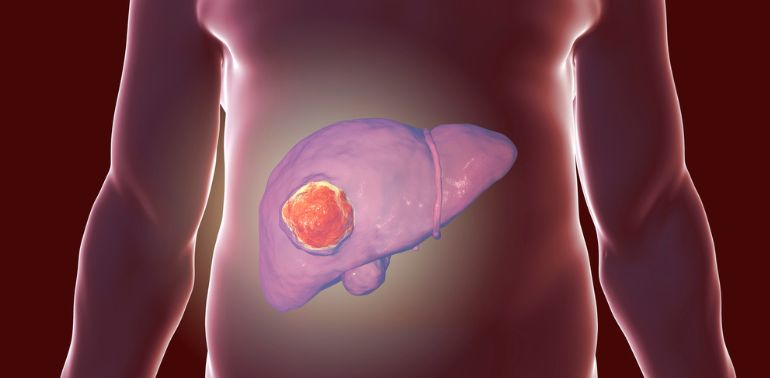What is Liver Cancer?
Liver cancer, also known as hepatocellular carcinoma (HCC), is a type of cancer that begins in the liver, the large organ located on the right side of the abdomen. The liver plays a vital role in processing nutrients, filtering toxins, and producing bile. Liver cancer can develop in individuals with chronic liver disease or cirrhosis, often linked to conditions like hepatitis B or C, fatty liver disease, and heavy alcohol consumption.
Primary liver cancer starts in the liver, whereas secondary liver cancer (metastatic liver cancer) spreads to the liver from other parts of the body, such as the colon or lungs.
Types of Liver Cancer
There are different types of liver cancer, but the most common is hepatocellular carcinoma (HCC), which originates from liver cells. Other rarer types include:
- Intrahepatic cholangiocarcinoma: A cancer that starts in the bile ducts of the liver.
- Hepatoblastoma: A rare liver cancer that occurs mainly in children.
Risk Factors for Liver Cancer
Several factors can increase the risk of developing liver cancer, including:
- Chronic viral infections: Hepatitis B (HBV) and hepatitis C (HCV) viruses increase the likelihood of liver cancer.
- Cirrhosis: Scarring of the liver tissue caused by long-term liver damage, often from alcohol abuse or viral infections.
- Non-alcoholic fatty liver disease (NAFLD): Associated with obesity and diabetes.
- Heavy alcohol use: Chronic alcohol consumption can lead to cirrhosis, which increases cancer risk.
- Aflatoxin exposure: Toxins produced by certain molds found in food can contribute to liver cancer, particularly in parts of Asia and Africa.
- Family history: Genetic factors may increase the risk of liver cancer.
Signs and Symptoms of Liver Cancer
Liver cancer often doesn’t present noticeable symptoms in its early stages. However, as the tumor grows, patients may experience:
- Unexplained weight loss
- Loss of appetite
- Pain or swelling in the upper abdomen
- Fatigue and weakness
- Jaundice (yellowing of the skin or eyes)
- Nausea and vomiting
- Itchy skin
- Enlarged liver or spleen
Because many of these symptoms overlap with other conditions, liver cancer is often diagnosed later in its progression, making early detection crucial.
Diagnosis of Liver Cancer
If liver cancer is suspected, several diagnostic tests may be performed to confirm the diagnosis and determine the extent of the disease:
- Blood tests: Checking for liver function and cancer markers (e.g., alpha-fetoprotein or AFP).
- Imaging tests: CT scans, MRIs, and ultrasounds help to visualize the liver and identify tumors.
- Biopsy: In some cases, a sample of liver tissue is taken for laboratory analysis to confirm cancer.
Treatment Options for Liver Cancer
Treatment for liver cancer depends on the stage of the cancer, liver function, and the patient’s overall health. Common treatment options include:
Surgery:
- Liver Resection: Removal of the tumor if the cancer is localized and the liver is functioning well.
- Liver Transplantation: In cases where the liver cancer is widespread or when cirrhosis is present, a liver transplant may be considered.
Ablation and Embolization:
- Radiofrequency Ablation (RFA): Uses heat to destroy the tumor.
- Percutaneous Ethanol Injection (PEI): Injecting alcohol into the tumor to shrink or kill it.
- Transarterial Embolization (TAE): Blocks the blood vessels feeding the tumor.
- Transarterial Chemoembolization (TACE): Combines chemotherapy with embolization.
Radiation Therapy:
- External Beam Radiation: High-energy rays are targeted at the tumor to kill cancer cells.
- Stereotactic Body Radiation Therapy (SBRT): A precise form of radiation therapy for small tumors.
Targeted Therapy:
- Drugs that target specific molecules involved in cancer cell growth and survival (e.g., sorafenib, lenvatinib).
Immunotherapy:
- Boosts the body’s immune system to recognize and destroy cancer cells. PD-1 inhibitors like nivolumab and pembrolizumab have shown promise for liver cancer.
Chemotherapy:
- Although chemotherapy is not commonly used for liver cancer, it may be used in advanced cases or when the cancer has spread.
Prevention and Lifestyle Adjustments
While not all cases of liver cancer can be prevented, certain steps can help reduce your risk:
- Vaccination: Get vaccinated against hepatitis B to reduce the risk of liver cancer.
- Limit alcohol consumption: Reducing alcohol intake can prevent cirrhosis and liver cancer.
- Maintain a healthy weight: Prevent and manage conditions like fatty liver disease and diabetes.
- Regular screenings: People at higher risk, such as those with chronic hepatitis or cirrhosis, should have regular liver cancer screenings (e.g., ultrasounds or blood tests).
- Avoid exposure to harmful chemicals: Minimize exposure to toxins such as aflatoxins and industrial chemicals that may harm the liver.
Prognosis and Survival Rates
The prognosis for liver cancer depends on several factors, including the stage of cancer at diagnosis, the patient’s liver function, and the overall health of the individual. Early-stage liver cancer may be treatable with surgery or ablation, and the survival rate improves significantly with early detection.
However, liver cancer is often diagnosed at a later stage, when treatment options are more limited. The survival rate for advanced liver cancer can be lower, but treatments like targeted therapy and immunotherapy are improving outcomes for some patients.
Living with Liver Cancer
A liver cancer diagnosis can be overwhelming, but it’s important to remember that support is available. Consider the following:
- Support groups: Joining a support group or seeking counseling can help with emotional and psychological challenges.
- Nutrition: Maintaining proper nutrition is essential, especially when undergoing treatment.
- Palliative care: For patients with advanced liver cancer, palliative care focuses on relieving symptoms and improving quality of life.

 Get Clinic or Online Consultation
Get Clinic or Online Consultation